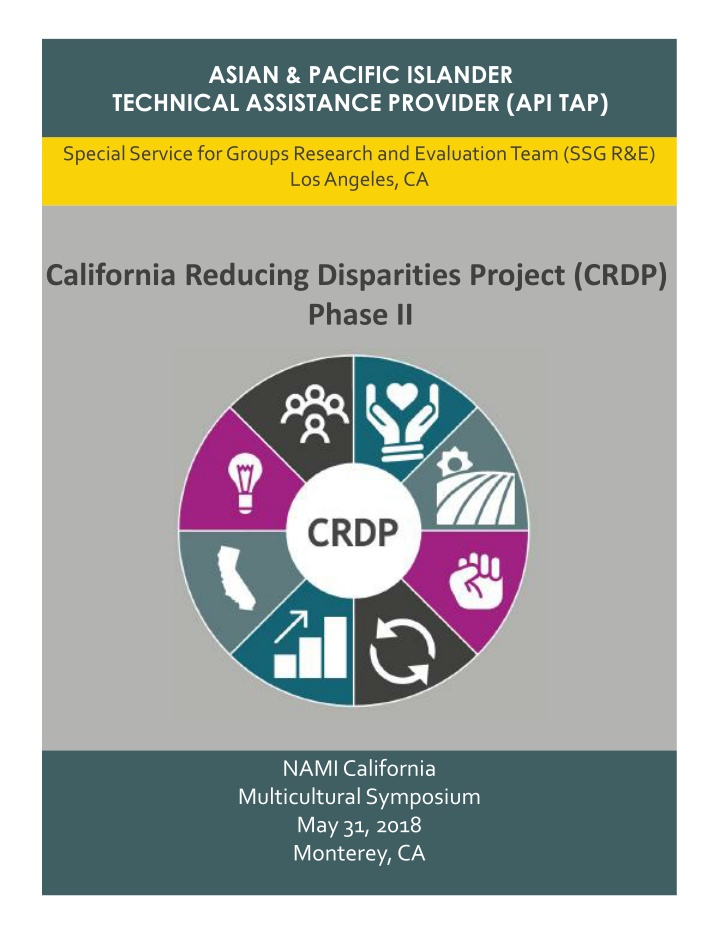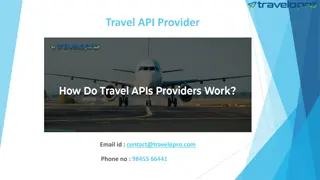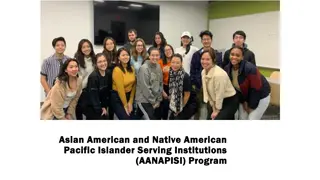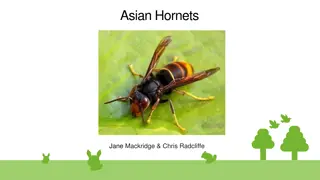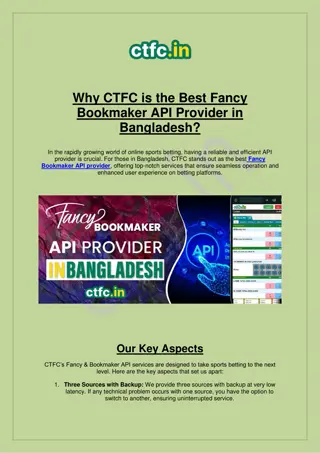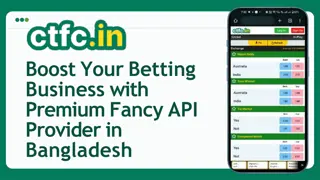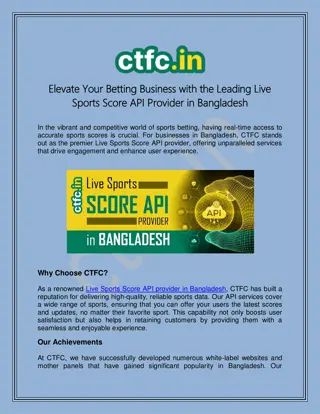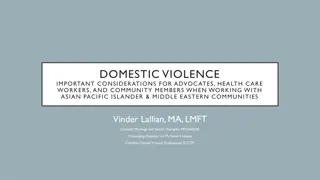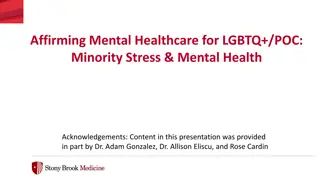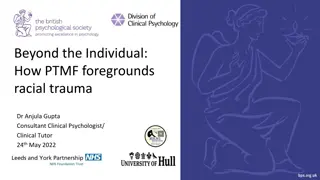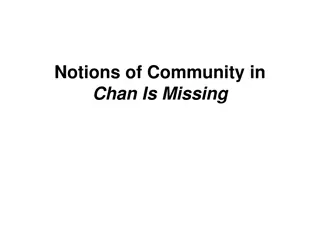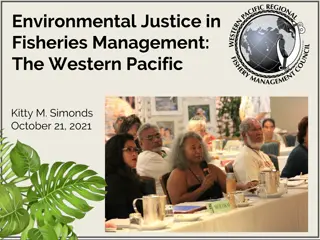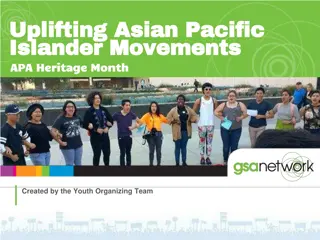Asian Pacific Islander Technical Assistance Provider (API TAP) - Mental Health Disparities Reduction Program
This program aims to reduce mental health disparities in underserved communities, focusing on African Americans, Asian and Pacific Islanders, Latinos, LGBTQ individuals, and Native American/Alaska Native populations. It involves funding community-defined evidence practices to address mental health issues among diverse populations like Cambodian transition-age youth and adults. The Community Wellness Program by Cambodian Association of America promotes mental wellness through culturally sensitive interventions, including Community Health Workers and educational workshops.
Uploaded on Sep 17, 2024 | 0 Views
Download Presentation

Please find below an Image/Link to download the presentation.
The content on the website is provided AS IS for your information and personal use only. It may not be sold, licensed, or shared on other websites without obtaining consent from the author.If you encounter any issues during the download, it is possible that the publisher has removed the file from their server.
You are allowed to download the files provided on this website for personal or commercial use, subject to the condition that they are used lawfully. All files are the property of their respective owners.
The content on the website is provided AS IS for your information and personal use only. It may not be sold, licensed, or shared on other websites without obtaining consent from the author.
E N D
Presentation Transcript
ASIAN & PACIFIC ISLANDER TECHNICAL ASSISTANCE PROVIDER (API TAP) Special Service for Groups Research and Evaluation Team (SSG R&E) Los Angeles, CA California Reducing Disparities Project (CRDP) Phase II NAMI California Multicultural Symposium May 31, 2018 Monterey, CA
Asian & Pacific Islander Technical Assistance Provider (API TAP) Special Service for Groups Research & Evaluation Team (SSG R&E) Dr. Camillia Lui, Alcohol Research Group Dr. Jacqueline Tran, Independent Consultant Community Driven Social Justice Values Relational Technical Expertise 2
The California Reducing Disparities Project (CRDP) is a statewide prevention and early intervention effort to reduce mental health disparities in underserved communities African Americans; Asian and Pacific Islanders; Latinos; Lesbian, Gay, Bisexual, Transgender, Queer/Questioning (LGBTQ); and Native American/Alaska Native. Phase 2 focuses on providing funding to implement practices and strategies identified in order to demonstrate community-defined evidence to reduce mental health disparities. ASIAN & PACIFIC ISLANDER (API) POPULATION Muslim American Society Social Services Foundation Hmong Cultural Center of Butte County (Oroville) (Sacramento) URDU PASHTO HMONG DARI Asian American Recovery Services (San Mateo County) East Bay Asian Youth Center (Sacramento) TONGAN SAMOAN IU MIEN HMONG The Fresno Center (Fresno, Merced & San Joaquin Counties) with Lao Family of Merced & Lao Family of Cambodian Association of America (Long Beach & Santa Ana) with: United Cambodian Community, Khmer Parents Association, Families in Good Health, & The Cambodian Family Stockton HMONG KHMER Korean Community Services (Orange County) with Southland Integrated Services KOREAN VIETNAMESE CRDP API PILOT PROJECTS
COMMUNITY WELLNESS PROGRAM A Community-Defined Evidence Program by Cambodian Association of America, United Cambodian Community, The Cambodian Family, Families in Good Health Pilot Project of the California Reducing Disparities Project for Asian Pacific Islander Communities POPULATIONS SERVED Cambodian transition- age youth 16+ (TAY), adults and older adults The CWP is a Prevention and Early Intervention program that aims to promote mental wellness by following a strength-based model. This process involves the use of Community Health Workers (CHWs) as change agents and the integration of key cultural elements. The CWP will demonstrate sensitivity to cultural/linguistic/historical issues in an effort to reduce mental illness stigma, increase access to mental health services, and improve the overall mental and physical health among Cambodians in Long Beach and Santa Ana. Over the years, EBAYC has moved away from imposing Asian culture. Instead Groundworks focuses on exploring a multicultural identity, youth culture, a connection to one s self, and a sense of place and community. PROGRAM COMPONENTS LANGUAGE Khmer Long Beach and Santa Ana KEY OUTCOMES CHW-Led Community Outreach & Engagement Services 1. Increasing awareness of mental health symptoms and conditions Educational Workshops 2. Providing education on how to address mental health symptoms early and promote mental well-being and healthy living Case Management/Navigation/Engagement & Referral Services 3. Decreasing the stigma of mental health issues 4. Increasing access to linguistically and culturally appropriate mental health services by providing information, education, referral services Peer and Family Social Support Groups KEY STRATEGIES 5. Engaging vulnerable adults and older adult clients in available resources in the community CONTACTS Kimthai Kuoch, CAA- CEO Sotheavottey Soeung, CAA- CWP Coordinator Susana Sngiem, UCC- Executive Director Lavyn Tham, UCC-Program Coordinator Engly Tung, UCC-Health Navigator LINGUISTICALLY AND CULTURALLY APPROPRIATE APPROACHES BILINGUAL AND BICULTURAL COMMUNITY HEALTH WORKERS SPIRITUALLY-RESPONSIVE APPROACHES The CWP is comprised of a Cambodian Advocacy Collaborative (CAC) consisting of five nonprofit agencies. The Cambodian Association of America (CAA) is committed to improving the quality of life in the community by providing linguistically and culturally appropriate social, health, outreach education and employment services to low-income children and families. United Cambodian Community (UCC) promotes and advocates for the well-being and advancement of the Cambodian community. Khmer Parent Association (KPA) s mission is to produce tomorrow s leaders of today s Khmer youth through higher education, tutoring, leadership development, scholarships, and health education to youth, women, and families. The mission of The Cambodian Family (TCF) is to promote social health by providing immigrant families the opportunities to develop the knowledge, skills, and desires for creating health and well-being in their lives. Families in Good Health (FiGH) is a multilingual, multicultural health and social education program for Southeast Asian, Latino and other communities in Long Beach. Its mission is to help the community make informed choices and gain access needed health and social resources. Vattana Peong, TCF- Executive Director Sicheang Cindy Phou, TCF-Staff CHW (Health Navigator) Amina Sen-Matthews, TCF- Health Program Director Lindsay Gervacio, FiGH- Manager Local Evaluators: California State University, Long Beach, Center for Health Equity Research (CHER): Laura D'Anna CHER Director; Pari Sabado, Director of Community Engagement & Evaluation; Annalyn Valdez-Dadia, Evaluation Manager cambodianusa.com | ucclb.org | khmerparent.org | cambodianfamily.org dignityhealth.org/socal/locations/stmarymedical/about-us/community-benefits/families-in-good-health
EBAYC PROGRAM A Community-Defined Evidence Program by East Bay Asian Youth Center (EBAYC) Pilot Project of the California Reducing Disparities Project for Asian Pacific Islander Communities EBAYC s mission is to empower Southeast Asian youth to lead healthy, peaceful, and productive lives. This program de-stigmatizes and de-mystifies the concept and nature of mental health among Southeast Asian youth and their families through its consistent, reliable, and culturally-responsive process of relationship- building, advocacy, and community outreach and education. POPULATIONS SERVED High-risk, low- income Southeast youth ages 14-18 Over the years, EBAYC has moved away from imposing Asian culture. Instead this program focuses on exploring a multicultural identity, youth culture, a connection to one s self, and a sense of place and community. LANGUAGES Iu Mien Hmong PROGRAM COMPONENTS Sacramento KEY OUTCOMES Orientation or Engagement period for Youth Needs and Strengths Assessment .Build critical protective/resiliency factors, particularly the development of positive bicultural identity, relationships with caregiving adults, and healthy self- management skills. .Reduce risk factors for mental illness, education attainment, and involvement with the criminal justice system .Strengthen and improve family functioning through family case management with parents and other primary caregivers. Individual Mentoring and Counseling Service Access and Monitoring Culturally-Responsive Gender-Based Therapeutic Activity Groups (TAG) Staff Cultural Competence KEY STRATEGIES CONTACTS David Kakishiba Executive Director junji@ebayc.org ebayc.org Local Evaluator: Ruthie Chang, HTA Consulting . Whole-family approach culturally & linguistically responsive staff Program flexibility Youth-Focused EBAYC envisions a future where all young people grow up to be lifelong builders of a just and compassionate multicultural society. Our mission is to support all youth be to be safe, smart, and socially responsible.
THE HMONG HELPING HANDS INTERVENTION A Community-Defined Evidence Program by Fresno Center for New Americans and their Hmong Mental Health Collaborative Partners (MMHCP) - Lao Family of Merced and Lao Family Community Empowerment Pilot Project of the California Reducing Disparities Project for Asian Pacific Islander Communities The Hmong Helping Hands (HHH) intervention is a direct prevention and early intervention program that aims to reduce depression, anxiety, and acculturation issues in Hmong adults and elders by improving their physical, psychological, social, and spiritual well-being and increasing their knowledge/awareness of mental health issues. POPULATION SERVED Over the years, EBAYC has moved away from imposing Asian culture. Instead Groundworks focuses on exploring a multicultural identity, youth culture, a connection to one s self, and a sense of place and community. PROGRAM COMPONENTS Hmong adults and elders LANGUAGE Hmong Hmong Talk Based on the Hmong Cultural Practice of Qhuab Ntuas (Khua-Thua) San Joaquin Valley KEY OUTCOMES .Improving Hmong adults and elders physical, psychological and spiritual well-being and their sense of belonging .Reducing Hmong adults and elders psychological distress CONTACTS Ncig Teb Chaw (Exploration) Cultural Arts, Crafts, and Activities Maij-Maij (Beautiful) Hmong Spiritual Healing Staff Contacts: Dr. Ghia Xiong, ghiaxiong@fresnocenter.org Melanie Vang melanie@fresnocenter.org KEY STRATEGIES Local Evaluator: Dr. Toni Knott Culturally-relevant activities to address mental well-being and holistic health Spiritually-oriented approach to healing Community navigation and exploration Fresno Center for New Americans (FCNA) provides services to the growing needs of Southeast Asian refugees (Cambodians, Hmong, Lao, and Vietnamese) in Fresno County. These services include mental health, education, employment services, social integration, health education, civic engagement, advocacy, housing, and refugee services. Lao Family Community Empowerment, Inc. serves the thousands of Hmong refugees in an eight-county region extending from Stanislaus County to Butte County. Lao Family provide critical services for newcomers English-language education and employment programs, housing assistance and health outreach, mental health services and acculturation training. Merced Lao Family Community, Inc s mission is to encourage self-respect and self-sufficiency for all ethnic groups in Merced County; to maintain pride in cultural histories and to offer positive support and hope for the future by leading the populace into becoming well-informed, healthy, productive, self-sufficient, and contributing members of our Central Valley community. www.fresnocenter.com| www.lfcempowerment.org|www.laofamilymerced.org
INTEGRATED CARE COORDINATORS A Community-Defined Evidence Program by Korean Community Services (KCS) in partnership with Southland Integrated Services (SIS) formerly known as Vietnamese Community of Orange County Pilot Project of the California Reducing Disparities Project for Asian Pacific Islander Communities The Integrated Care Coordinators (ICC) project is a community health worker prevention and early intervention program that aims to prevent or reduce trauma, anxiety, and depression among urban immigrants of Korean and Vietnamese ethnicities by decreasing self and social mental health stigma, strengthening cultural/spiritual/community protective factors, and increasing access/utilization of mental health services. POPULATIONS SERVED Korean & Vietnamese immigrants LANGUAGES PROGRAM COMPONENTS KOREAN VIETNAMESE Orange County KEY OUTCOMES 1. Increase access, affordability, availability and quality of mental health services. Decrease mental health stigmatization. Increase outreach, support and education on mental health issues. Improve overall health and wellness. Improve spirituality. Empower community through community participation in the decision-making process. INFORMATION AND REFERRAL LINKAGES AND FOLLOW-UP ONGOING INTEGRATED CARE 2. 3. KEY STRATEGIES 4. NO WRONG DOOR approach to needs assessment and linkages to services 5. 6. WHATEVER IT TAKES as far as types of assistance provided to HELP clients access services CONTACTS Jungwon Kim, KCS jukim@koreancommunity.org WARM HAND-OFF to qualified providers to prevent falling through the cracks ______, SIS koreancommunity.org Local Evaluators: NOON-CHI or culturally-grounded relational focus as far as emotional support, checking in cultural and linguistic sensitivity Dr. Mikyong Kim-Goh Dr. Karen Kyeunghae Lee Department of Social Work California State University, Fullerton KCS assists and empowers Korean American individuals, families, and the greater immigrant community through the promotion of projects and programs that provide culturally and professionally competent human services to unserved and underserved Korean prevention efforts . SIS provides comprehensive support services to Vietnamese Americans to enable them to become actively participating citizens in mainstream society through empowerment and capacity enhancement of each citizen.
ESSENCE OF MANA A Community-Defined Evidence Program by Asian American Recovery Services Pilot Project of the California Reducing Disparities Project for Asian Pacific Islander Communities MANA is an indirect Prevention and Early Intervention (PEI) program that aims to prevent and/or reduce mental illness among Samoan and Tongan families living in Northern San Mateo County.This program will emphasize the tradition of spiritual connection to higher power and physical, mental, and spiritual wellness. POPULATIONS SERVED Samoan and Tongan adults 18+ and their families LANGUAGES There is a stigma in seeking services. The hardest barrier to deal with depression or sadness is to figure out how to address taboo topics. In the Pacific Islander community, everything we talk about is taboo. You do not have a voice unless you are a High Chief or family matriarch, so there is a need to find your voice and learn how to use it. TONGAN SAMOAN Northern San Mateo County KEY OUTCOMES .Improve communication skills among family members .Increase leadership skills & community involvement .Increase knowledge on signs, symptoms and risk factors of mental health conditions (including offering and receiving support) .Find voice and understanding of spiritual beliefs .Reduce stigma around mental health conditions and other taboo topics .Increase access to culturally supportive care and services PROGRAM COMPONENTS MANA Family Workshops: Parent-Caregiver Classes, Youth Classes, Child Care, Family Nights, Community Wellness Celebration Culturally Competent Referrals to Mental Health and Social Services Community Outreach and Engagement: Community Advisory Board, Community Informed Approach, Community Member Involvement KEY STRATEGIES CONTACTS Nani Wilson, Project Supervisor nwilson@aars.org Brittany Afu, Lead Facilitator bafu@healthright360.org healthright360.org/agency/asian- american-recovery-services CULTURALLY AND SPIRITUALLY-RESPONSIVE STORYTELLING COMMUNITY-GROUNDED Local Evaluator: CAMI Consulting, Inc. Asian American Recovery Services (AARS) provides an array of culturally competent services to the Asian and Pacific Islander and other ethnically diverse communities of the San Francisco Bay Area. AARS is dedicated to reducing the impact and incidence of substance usetheArea. Our programs serve youth, adults, and families, and are located in San Francisco, Santa Clara, and San Mateo counties.
SHIFA FOR TODAY A Community-Defined Evidence Program by the Muslim American Society-Social Services Foundation (MAS-SSF) Pilot Project of the California Reducing Disparities Project for Asian Pacific Islander Communities POPULATION SERVED South Asian Muslims (SAMs) Shifa for Today is an early intervention program that aims to reduce trauma, anxiety, depression, and suicidal thoughts among South Asian Muslim (SAM)adults by developing a culturally competent mental health workforce, increasing access and utilization of mental health services, increasing social support, and decreasing psychological distress. SAMs trace their ancestry to Afghanistan, Bangladesh, Bhutan, India, Iran, the Maldives, Nepal, Pakistan, and Sri Lanka. Over the years, EBAYC has moved away from imposing Asian culture. Instead Groundworks focuses on exploring a multicultural identity, youth culture, a connection to one s self, and a sense of place and community. PROGRAM COMPONENTS LANGUAGES URDU PASHTO DARI Sacramento KEY OUTCOMES .Reduce psychological distress and improve hopefulness and recovery by increasing functioning, social support, empowerment, and access and utilization of mental health services .Identify clients/consumers inherent and acquired strengths and develop and maintain a healthy life after counseling .Develop skills to cope with the political climate of religious discrimination and bigotry, and immigration issues .Develop and maintain support systems including religious organizations and networks outside of the immediate family system Peer Counselor Training Curriculum Development Individual Peer Counseling Sessions with SAMs Training Peer Counselors KEY STRATEGIES Faith-based approaches rooted in Islamic traditional concepts and culturally-sensitive approaches One-on-one with non-judgmental approach, developing trust and rapport and having confidentiality and sensitivity Honoring family context and cultural considerations in an ethical manner when they promote healthy family relationships and dynamics Providing counseling in the native language of the clients/consumers CONTACTS Staff Contacts: Gulshan Yusufzai Executive Director gyusufzai@yahoo.com Using flexible practices to accommodate the diverse prevention and early intervention mental health needs of clients/consumers Bibi Maryam Lead Peer Counselor www.mas-ssf-sac.org Muslim American Society-Social Services Foundation is a non- profit that aims to aid families at large and the Muslim community in particular with their social services needs. Local Evaluator: Stanford Muslims and Mental Health Laboratory
ZOOSIAB A Community-Defined Evidence Program by the Hmong Cultural Center of Butte County Pilot Project of the California Reducing Disparities Project for Asian Pacific Islander Communities POPULATION SERVED Hmong elders The Zoosiab program is a community-based prevention and early intervention program that aims to prevent and/or reduce mental health problems (psychological distress, emotional well-being) and social isolation among Hmong elders by strengthening sense of community and social engagement, improving psychological and spiritual mental health, and increasing access to culturally and linguistically appropriate mental health services. Over the years, EBAYC has moved away from imposing Asian culture. Instead Groundworks focuses on exploring a multicultural identity, youth culture, a connection to one s self, and a sense of place and community. PROGRAM COMPONENTS LANGUAGES Hmong Chico and Oroville Butte County Group Activities (includes recreational group, field trip, and community garden) and Health education sessions KEY OUTCOMES .Improve Hmong elders access and use of mental health services .Improve Hmong elders mental health status and social well-being .Increase understanding of Hmong attitudes and beliefs about mental health .Improve knowledge of the health topics covered for Hmong elders Resource Connections (linkages to health and mental health services; Referrals to shamans or community leaders for mental health issues); care coordination (or patient navigation), and transportation services to and from referral sites Individual Services (office visits (counseling/discussion), home visits, interpretation/translation services, companion services to go with them to offsite mental health or shaman services) KEY STRATEGIES CONTACTS Staff Contacts: Seng Yang Executive Director ssyang@hmongculturalcenter. net Recreation Groups (or Elder-to-Elder Support Groups) Engage in non-stigmatizing ways that strengthen social connections, are culturally acceptable and also help build bi-cultural bridges Staff who are linguistically competent creating cultural sensitivity and trust with the participants Yia Xiong Health Program Lead yxiong2@hmongculturalcenter. net The mission of Hmong Cultural Center of Butte County (HCCBC) is to improve the lives of individuals and families through culturally sensitive education, advocacy, support, and services. HCCBC strives to preserve essential Hmong beliefs and restore acceptable cultural practices and values. HCCBC provides resources, community based family support and empowerment through the promotion of health, education, cultural integration, and social services to strengthen Hmong families and communities throughout Butte County. Der Vang Program Assistant dvang@hmongculturalcenter. net hmongculturalcenter.net Local Evaluator: Dr. Winston Tseng winston@berkeley.edu
CONTACT Erica Shehane, MPH, LCSW Director of Research & Evaluation Special Service for Groups (SSG) eshehane@ssg.org | 213-553-9350 Information Action
